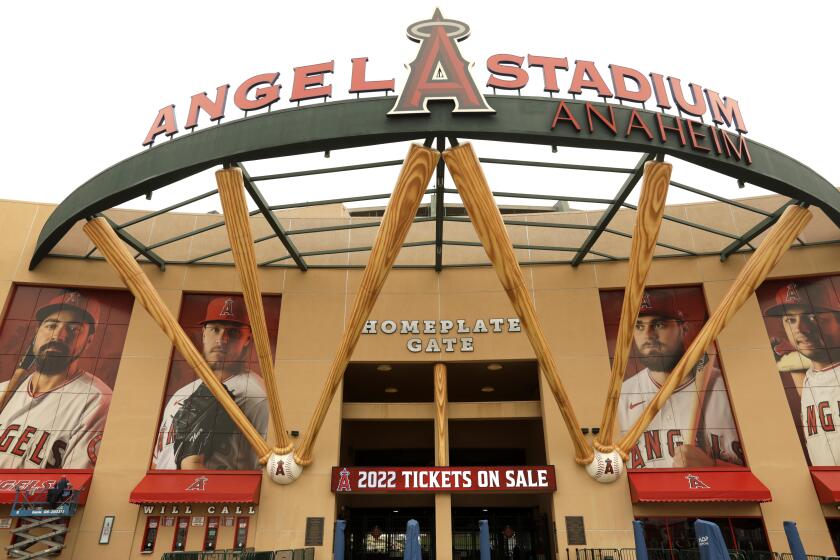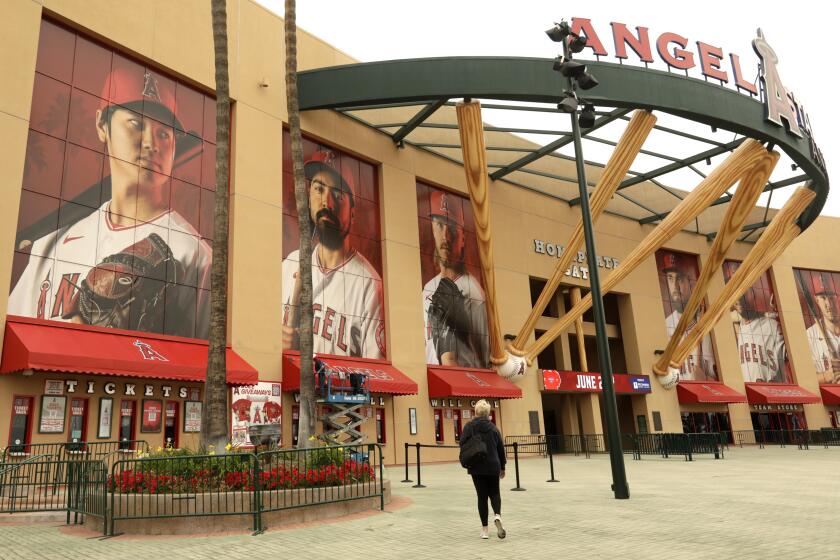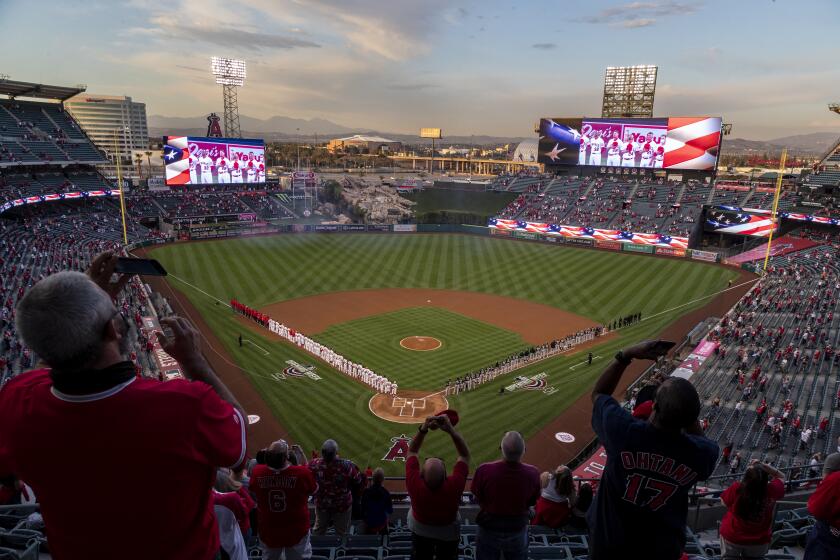Q&A: With the Angel Stadium sale axed, what are the Angels’ long-term plans in Anaheim?
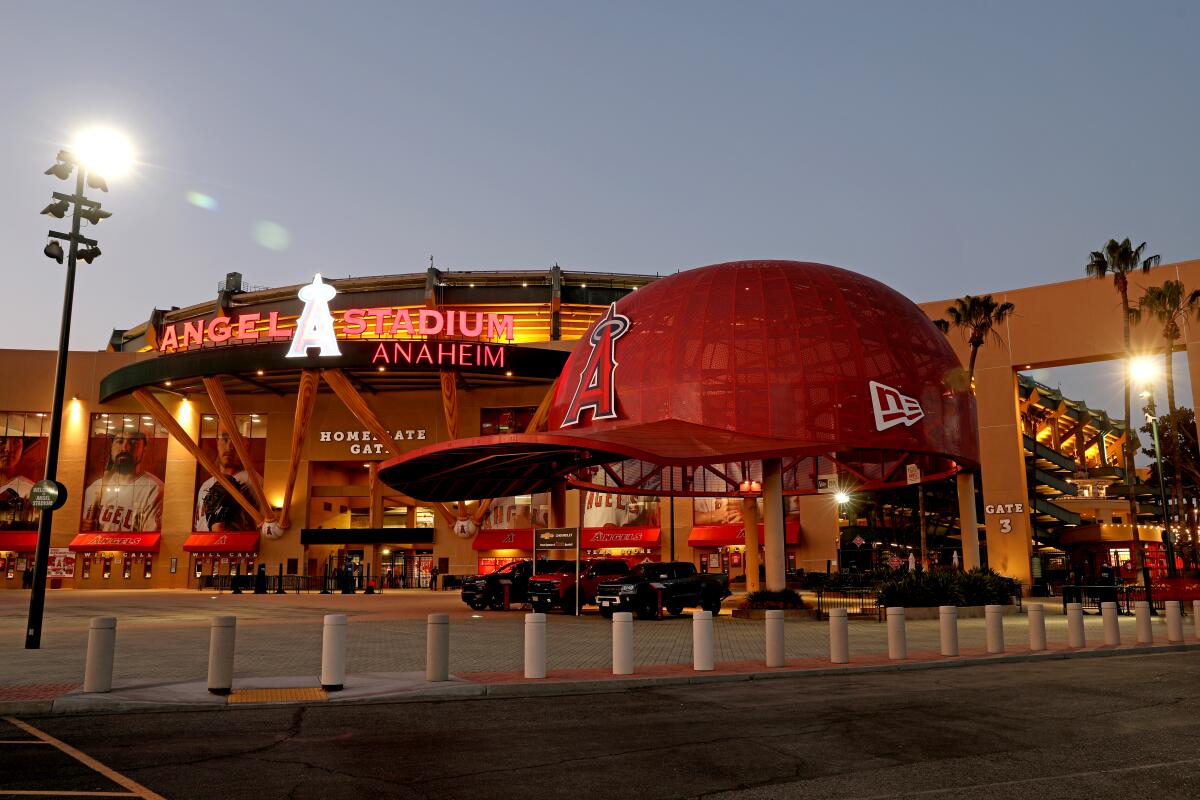
- Share via
On Wednesday morning, within 12 hours of the Anaheim City Council killing the Angel Stadium sale, the city of Long Beach renewed its pitch to lure the Angels. On Wednesday afternoon, the city of Anaheim formally asked the Angels to agree to void the deal and preserve all documents related to it, in anticipation of a possible lawsuit. On Friday night, the Angels told the city they were done with the deal.
On the field, Mike Trout and Co. have powered the Angels to their best start since 2004. For a team that last won a postseason game in 2009, these should be unreservedly good times.
Alas, as the Angels’ long-term future turns into a giant question mark, some questions and answers:
Are the Angels moving to Long Beach?
In 2019, the Angels flirted with Long Beach, before negotiating the stadium sale intended to anchor them in Anaheim. On Wednesday, Long Beach flirted back, since the waterfront parking lot that would have been used for a ballpark there remains undeveloped and available.
Would the team be called the Long Beach Angels?

In the 1960s, founding owner Gene Autry wanted to move his Los Angeles Angels out of Dodger Stadium and into Long Beach. At the time, the city said the team would have to be called the Long Beach Angels. Autry instead moved in 1966 to Anaheim, where city leaders blessed the name California Angels.
The team has not moved since then, even as the team name has changed from California Angels to Anaheim Angels and back to Los Angeles Angels. Arte Moreno, the current owner, spent millions in court for the right to slap a Los Angeles label on his team, and he would likely retain it wherever the team might play in Southern California.
Could Dodgers block Long Beach move?
No. Under Major League Baseball rules, the Dodgers and Angels share the same home territory, which includes Los Angeles and Orange counties.
The Angels once considered a proposal for a waterfront ballpark in Long Beach. The city said it would be happy to begin those negotiations again.
So are the Angels moving to Long Beach?
Not any time soon, and very possibly not at all. The vision of a waterfront ballpark is delightful, but the city and the team never did figure out how to pay for a billion-dollar stadium, in an era where California cities generally avoid funding the construction of professional sports venues. If the Angels pay for the ballpark and make money from developing the surrounding land — as was the plan in Anaheim — the land available for development is three times greater in Anaheim than in Long Beach.
Would the Angels move outside L.A. market?
Probably not. MLB is not the NFL, in which media revenue is shared equally among teams. The value of the Angels’ broadcast revenue — and of the franchise itself — is tied to a home in the second-largest media market in North America.
Are the Angels about to leave Angel Stadium?
No. The Angels’ current lease in Anaheim extends through 2029, and they have an ace in the hole if they wish to move. Rather than trying to negotiate a short-term lease to stay in Anaheim while a new ballpark elsewhere is under construction — hi, we’re leaving, how about a good deal in the meantime? — the Angels can exercise up to three options of three years each. That means the Angels can stay as long as 2038, if they like.
Three days after the Anaheim City Council decided to kill the Angel Stadium deal amid a corruption probe, the Angels have agreed to not contest the decision.
What happened to the Anaheim deal?
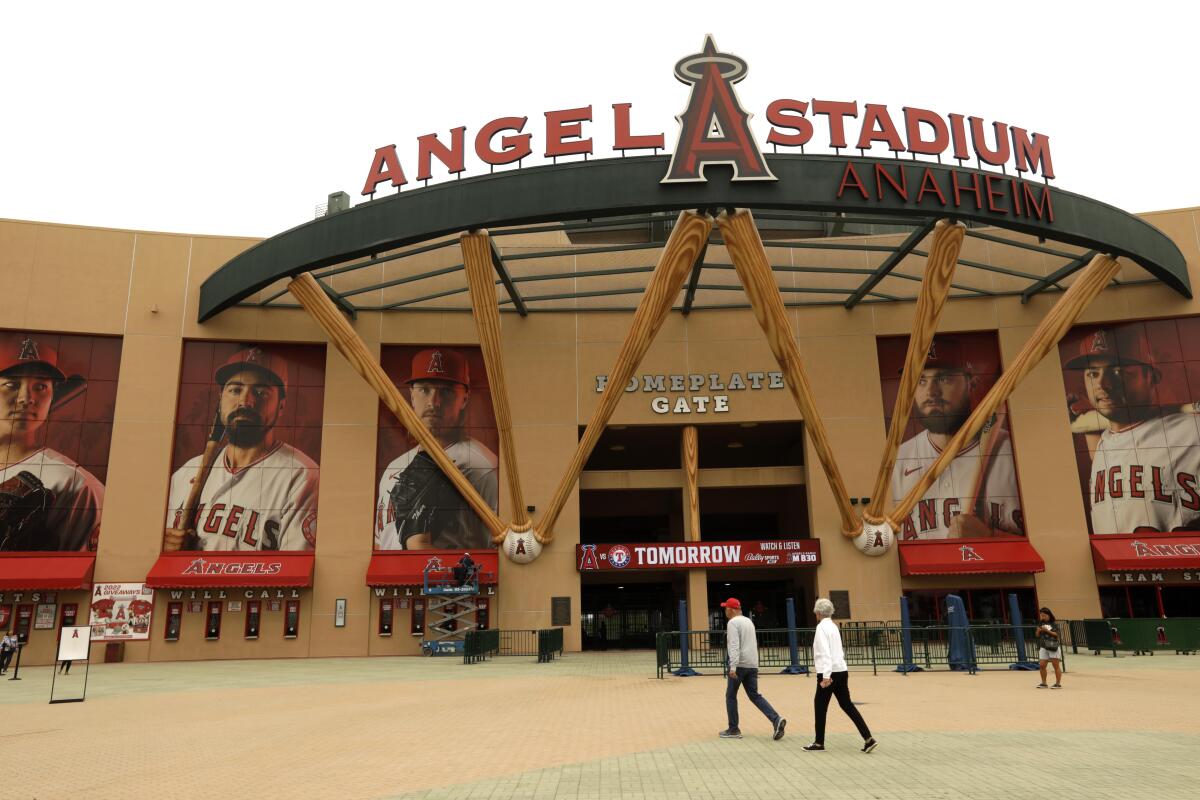
It was just about done until May 16, when an FBI affidavit emerged that alleged Anaheim Mayor Harry Sidhu had shared a confidential land appraisal with the Angels — as the city was negotiating against the team — in the hope of securing a million-dollar campaign contribution from them. Sidhu’s attorney has denied that, but the stench of corruption made the deal too tainted to proceed.
On Tuesday, the day after Sidhu resigned as mayor, dozens of speakers urged the Anaheim City Council to kill the deal. No one spoke in favor of it, and the council voted unanimously to call it off.
Several members of the council suggested it would be unwise to proceed with the deal now, then risk finding out later that additional FBI investigation had linked executives or lobbyists from the Angels to the alleged corruption.
City attorney Robert Fabela letter to Angels asking to agree to avoid the stadium deal.
In a letter sent Wednesday, city attorney Robert Fabela officially asked the Angels to agree to void the deal, citing several allegations in the affidavit that he believes “demonstrate that this deal was not a good faith, arm’s length transaction.”
In the affidavit, there is no allegation of wrongdoing by the Angels. Major League Baseball is aware of the affidavit and has reviewed it.
However, Fabela said during Tuesday’s council meeting: “It does strain credulity to say that, when there is discussion of reaching out to the Angels to seek campaign financing in order to advance the deal, that there wouldn’t be some knowledge on the other side in the course of that.”
In a letter to the city last week, Angels attorney Allan Abshez called the deal “the result of an honest arms-length negotiation.” On Friday, in confirming the Angels would agree to the city’s request, Angels spokeswoman Marie Garvey said: “We want to be clear: We negotiated in good faith with all elected officials and city staff and created a fair deal that was good for Anaheim and good for Angels Baseball.”
Why not just redo the deal?
For the second time in a decade, city staff has told Moreno the two sides had a stadium deal done. Each time, the deal collapsed. Moreno is not obligated to renegotiate.
In Tuesday’s council meeting, city manager James Vanderpool said he had asked the Angels to “reset this transaction in the interest of transparency and process.” He said the Angels declined.
On Friday, in response to the Angels’ agreement to abandon the sale agreement, Anaheim mayor pro tem Trevor O’Neil said “a long-term plan for the stadium site and baseball in Anaheim are still opportunities we want to explore” and said the city would keep “the door open for a fresh start when the time is right.”
There is no urgency now. At the least, Moreno figures to sit tight until after the November election, when a new mayor will be in place and the chief critic of the deal, Jose Moreno (no relation to Arte Moreno), will no longer be on the city council.
What happens to Angel Stadium?
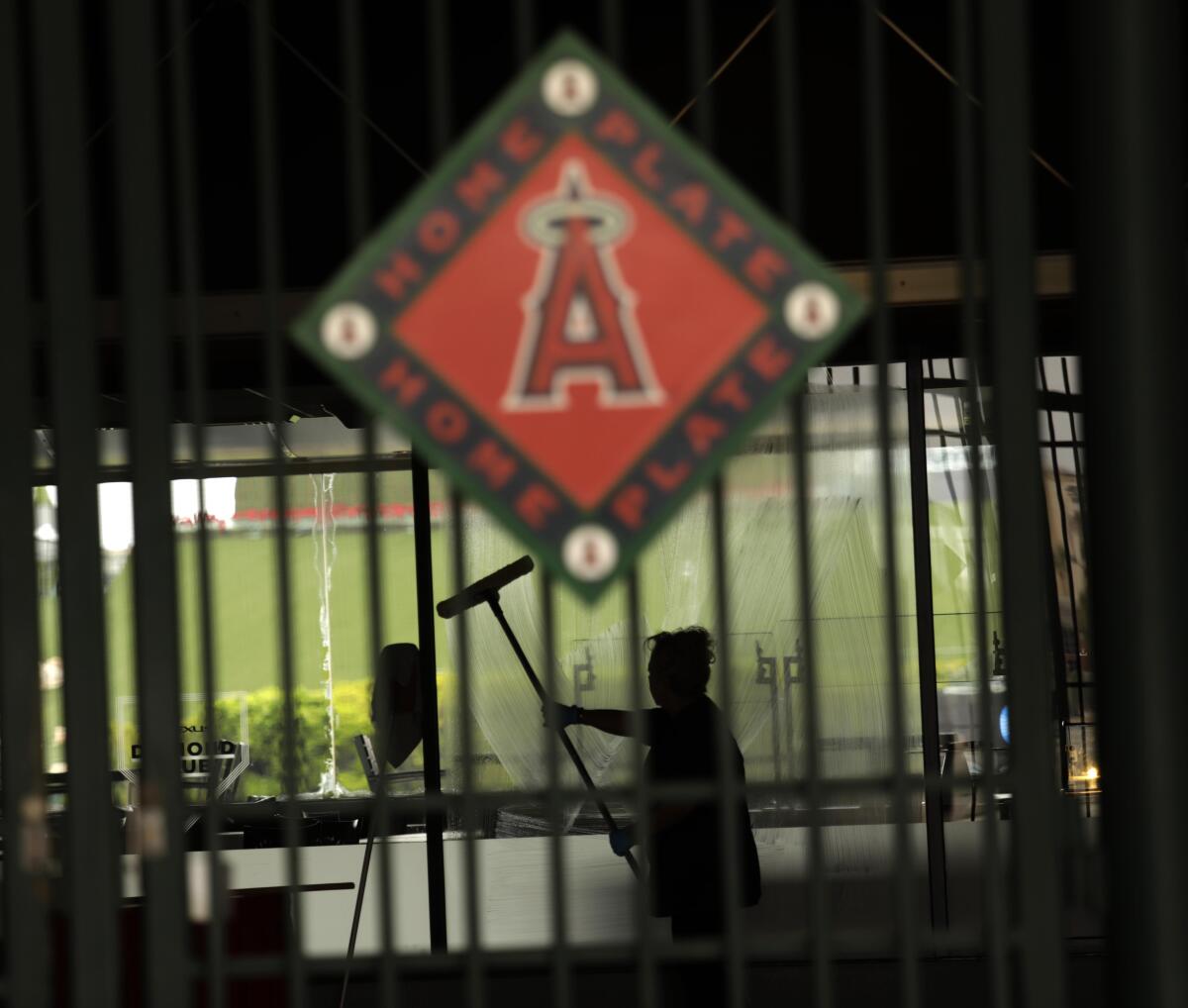
As time passes and emotions wane, perhaps the two sides resume negotiations. What made the Angel Stadium project attractive has not changed: for the Angels, no need to build a new stadium and the chance to put up a vibrant neighborhood around the ballpark; for the city, thousands of desperately needed homes and hundreds of millions of dollars from a development which the Angels would anchor into the second half of this century.
At the moment, though, this looks like a lose-lose-lose scenario: no revenue from the stadium sale and accompanying development for the city and its taxpayers; no dramatic upgrades to the stadium for the team and its fans; still nothing around the stadium except a sea of parking lots.
Running the stadium generally has been a break-even proposition for the city, with the Angels selling 3 million tickets every year of Arte Moreno’s ownership through 2019. Under the lease, the Angels pay the city $2 for every ticket sold above 2.6 million, but attendance was prohibited in 2020 and limited in 2021, because of the pandemic. As of Saturday, the Angels are on pace to sell 2.58 million tickets this season.
And a potential fight is looming: In 2013, when the city and the Angels first started negotiating, a jointly-commissioned study showed the stadium required $130 million to $150 million in infrastructure upgrades to remain viable for the long term.
The lease requires the Angels to maintain the stadium on par with “first class professional baseball stadiums, such as … Dodger Stadium.” The city and the Angels could spar on how that language should be interpreted and who should pay for significant upgrades.
If attendance is down, can I get a good deal?
Yes, and it would frankly be nuts to miss out on the chance to see Trout and Shohei Ohtani, live and in person, and at a low price. The Angels offer a family pack of four tickets, four hot dogs, and four sodas for $44. The average cost for a family of four to attend a major league game this season is $256, according to Team Marketing Report.
Records from an FBI probe show how business interests run the Orange County city home to Disneyland and the Angels.
So I’ll see Trout and Ohtani at Angel Stadium. Who won’t I see?
On opening day this season, fans could look up to the giant video board to see a welcome message from Sidhu. Here’s guessing you won’t see him on the big screen any time soon.
More to Read
Go beyond the scoreboard
Get the latest on L.A.'s teams in the daily Sports Report newsletter.
You may occasionally receive promotional content from the Los Angeles Times.

